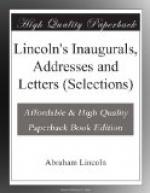The new Constitution of Louisiana, declaring emancipation for the whole State, practically applies the proclamation to the part previously excepted. It does not adopt apprenticeship for freed people, and it is silent, as it could not well be otherwise, about the admission of members to Congress. So that, as it applies to Louisiana, every member of the cabinet fully approved the plan. The message went to Congress, and I received many commendations of the plan, written and verbal, and not a single objection to it from any professed emancipationist came to my knowledge until after the news reached Washington that the people of Louisiana had began to move in accordance with it. From about July, 1862, I had corresponded with different persons supposed to be interested [in] seeking a reconstruction of a State government for Louisiana. When the message of 1863, with the plan before mentioned, reached New Orleans, General Banks wrote me he was confident that the people, with his military cooperation, would reconstruct substantially on that plan. I wrote him and some of them to try it. They tried it, and the result is known. Such only has been my agency in getting up the Louisiana government. As to sustaining it, my promise is out, as before stated. But as bad promises are better broken than kept, I shall treat this as a bad promise, and break it whenever I shall be convinced that keeping it is adverse to the public interest; but I have not yet been so convinced.
I have been shown a letter on this subject, supposed to be an able one, in which the writer expresses regret that my mind has not seemed to be definitely fixed on the question whether the seceded States, so called, are in the Union or out of it. It would, perhaps, add astonishment to his regret were he to learn that since I have found professed Union men endeavoring to make that question, I have purposely forborne any public expression upon it. As appears to me, that question has not been, nor yet is, a practically material one, and that any discussion of it, while it thus remains practically immaterial, could have no effect other than the mischievous one of dividing our friends. As yet, whatever it may hereafter become, that question is bad as the basis of a controversy, and good for nothing at all—a merely pernicious abstraction.
We all agree that the seceded States, so called, are out of their proper practical relation with the Union, and that the sole object of the government, civil and military, in regard to those States is to again get them into that proper practical relation. I believe that it is not only possible, but in fact easier, to do; this without deciding or even considering whether these States have ever been out of the Union, than with it. Finding themselves safely at home, it would be utterly immaterial whether they had ever been abroad. Let us all join in doing the acts necessary to restoring the proper practical relations between these States and the Union, and each forever after innocently, indulge his own opinion whether in doing the acts he brought the States from without into the Union, or only gave them proper assistance, they never having been out of it.




